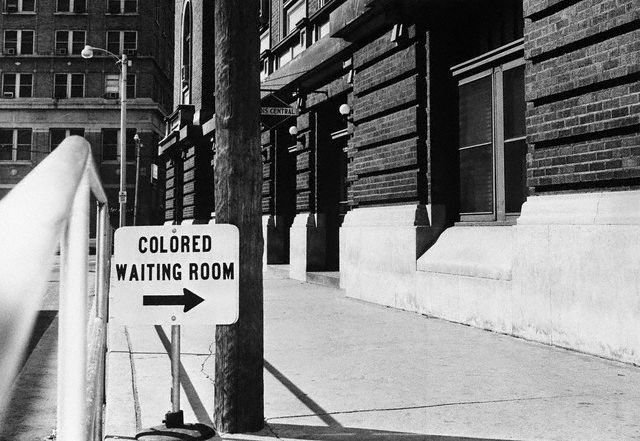A book review and interview with the author, Christopher Wilson

“Black mother, black family, black church, black soul, black neighborhood. Everything black about him except his color.”
- From the novel The Ballad of Lee Cotton by Christopher Wilson.
The Ballad of Lee Cotton, by British author Christopher Wilson, is a remarkable page-turner which submerges the reader into the improbable and challenging world of a "white black boy" born into a black family in the segregated 1950''s American South. Leifur Nils Kristjansson Saint Marie du Cotton (Lee Cotton) is the son of a mulatto mother, Corinne Arminta, and an Icelandic seaman by the name of Leifur Nils Kristjansson - whom he never met. Lee Cotton was a product of a five-day romance. Hanging on as a child to all he has left of his Icelandic father, a water-stained frayed-edge photo, Lee wonders about possible half-brothers and sisters around port cities across the Atlantic coast.
Christopher Lee has an uncanny talent for using words and accents in his prose to bring a rare reality to the world he brings alive in the book. From the undercurrent of Louisiana's voodoo heritage to the scars of racial politics in Mississippi, as they affect the souls of both blacks and whites, one has to wonder where the experience and inspiration come from. The answer is somewhat surprising.
Meeting Mr. Christopher Wilson at the lobby of the Westin Harbour Castle hotel in downtown Toronto during the 2005 International Festival of Authors, I am greeted by a tall and amiable Brit from North London who is in Toronto for the first time. In the elevator, on our way to a penthouse lounge set up for the festival's authors, we discuss my own 6-month stay in North London and commiserate on the misfortunes of Arsenal Football Club this season. We bond on our common fondness for North London. I expected him to likewise bring out more of the spirit of the American South from what I had assumed were his own travels or family connections with the area and times covered in the novel.
But to my surprise, he tells me, "I wrote this book from North London." He had never been to the southern United-States, or come across any of the characters in the book. But, as he explains, the topics of racial segregation, Civil Rights, and the women''s movement were all part of his coming of age in the 1960s. Those stories are from his generation. Wilson further illuminates that he obtained the bulk of his information from the Internet. He surfed hundreds of websites about the period. Hearing him talk the next day at a round table discussion with other IFOA authors at Harbourfront Centre in a discussion themed "The Writer's Life in the Information Age", one could see how Wilson sees the Internet as a powerful tool for the writer -- even capable of taking the place of a passport. Dispelling the unfounded fear of some in literary circles and in the panel that the Internet will spell the end of the novel, Christopher Wilson says: "We are a narrative species. We're always going to tell stories."
Speaking of his work on The Ballad of Lee Cotton. Wilson says, "I virtually spent three months" in the American Deep South. He was very meticulous in his research. And the final product shows it. He would look for actual details of what was popular in 1964. He combed through online chronicles of Mississippi''s oral history.
"You internalize the range of voices," Wilson indicates. In response to the possible criticism that he is too far removed to authentically write about the Deep South, Wilson argues, "Even New Yorkers don't know what the South is like."
But more than the actual location, Christopher Wilson is more interested in the "message" he wishes to convey. In fact, he even initially considered having the story based in South Africa. "The message precedes the character," he adds. In answer to my question of whether he had attempted to use fiction to freely write about the history of the period- without the factual constraints of non-fiction- Wilson maintains that The Ballad of Lee Cotton is not a history book. But capture the essence of the Civil Rights era in a human and unexpected way it certainly does.
We follow Lee Cotton as he struggles to find his place in a world where he is not supposed to exist. In a particularly moving part of the novel, his mother Corinne tells him: "You're a black soul in white wrapper ... but not everyone knows that, because they go by your skin. When you ride the bus, Leaf, you got to keep out of trouble. You got to remember one thing ... Black folk go in the back. White folk go up front." But, with much credit to him, Wilson goes beyond the basic formulaic racial dichotomy and delves further into the intricacies of the South''s racial politics as Lee Cotton''s mother warns him bout certain subtleties: "Anyone who knows you knows you're black. But strangers ... they're going to think you're white. So you don't want to crowd the nice black strangers by sitting with them. And you don't want to get uppity with no white folks that know you by taking their seat. And, then again, you don't want to offend no black neighbors by sitting apart. But you don't want no white strangers to think you're some ignorant redneck trash by sitting at the back."
Lee Cotton''s whole live in the novel is about walking that fine line. He falls in love with the daughter of a local Klansman, which will lead to one of two major incidents in his life. After being left for dead by everyone in his hometown of Eureka, Mississippi, including his own family, he relocates to St-Louis, where he lives as a white man for two years. In response to my own interpretation that Lee''s assumed death represents a metaphor for his leaving behind his black identity, Christopher Wilson instead argues that Lee didn't necessarily “choose” to be white but sought to find his most comfortable identity. But Wilson welcomes and enjoys the fact that different readers may take away different perspectives from his novel. That''s what good literature is all about. There are some very unusual but interesting turns of events which both precede and follow another major incident in his life later on during a stint in the army. The reader can never predict what comes next.
Having written seven novels in his twenty-year on-and-off writing career, The Ballad of Lee Cotton represents Christopher Wilson's first commercial success. Although his book Blueglass was longlisted for the Booker Prize, and his Mischief was shortlisted for the Whitbread Novel Award. The Ballad of Lee Cotton has received a good level of attention and good reviews by the press in the U.K.. Wilson is hopeful that the success will follow in the U.S. market as well, where his book has recently become available. The Ballad of Lee Cotton is definitely worth the read.




